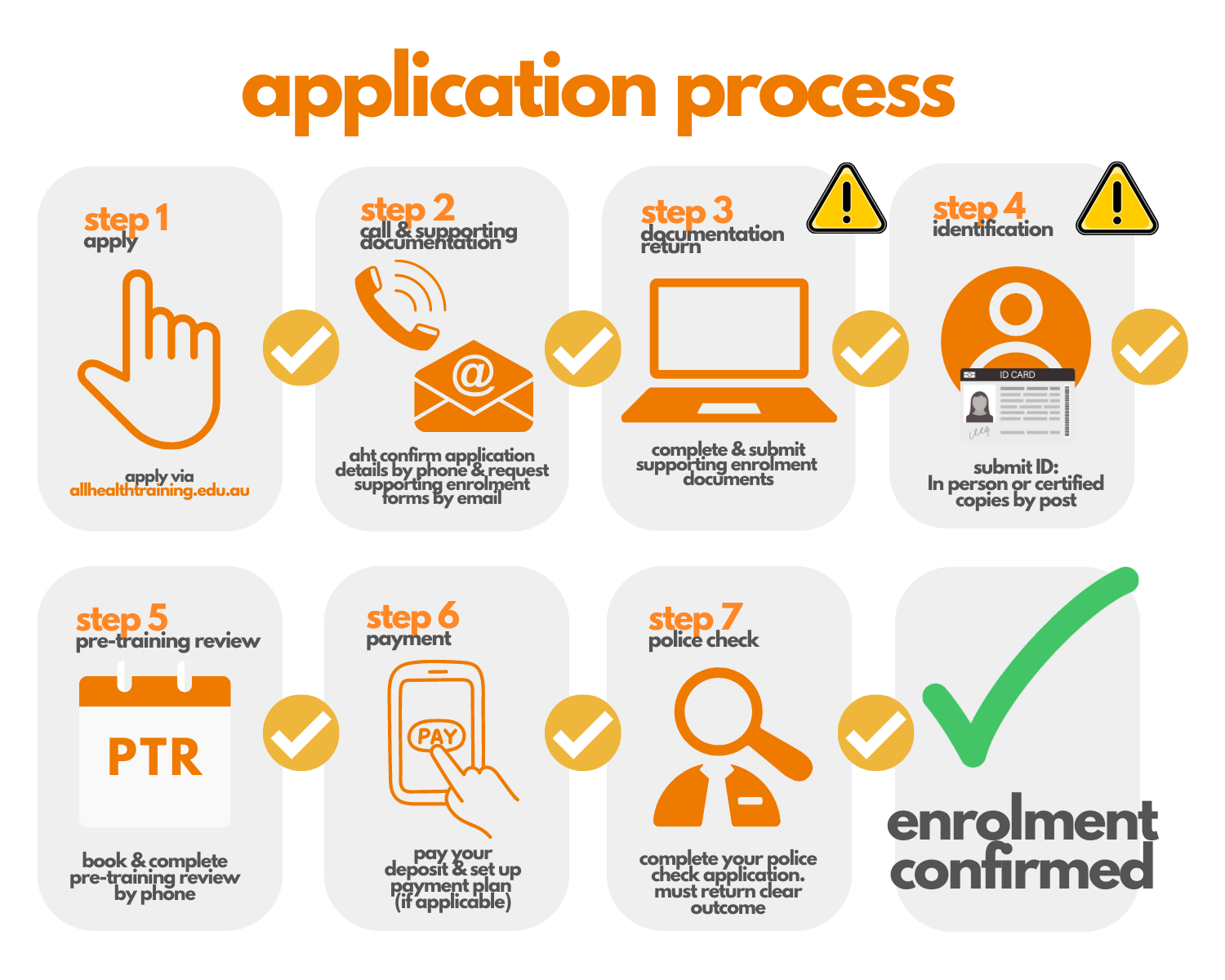

The Certificate III in Pathology Collection prepares you to excel as a pathology collector in various settings, such as hospitals, clinics, and private practices. You’ll acquire expertise in customer service, pathology collection techniques, phlebotomy (blood collection), infection control, work health and safety, medical terminology, visiting clients in their place of residence and electrocardiography (ECG).
The program also hones your skills in safely handling and storing pathology specimens, adhering to strict safety and ethical guidelines. Upon completion, you’ll effortlessly maintain accurate pathology records and communicate effectively with patients and healthcare professionals.
At All Health Training we’re dedicated to inclusivity. We embrace access and equity principles, and we invite individuals with disabilities and from First Nations communities to apply. We believe in the strength of diversity and are here to support every learner in reaching their potential.
Employment outcomes on completion of this course include:
This is an open entry program of study with participants needing to read, write and communicate in English to a level to perform the job.

*Delivery locations and duration varies between intakes. Please see upcoming dates.
| Unit Code | Units of Competency | |
|---|---|---|
| BSBMED301 | Interpret and apply medical terminology appropriately | |
| CHCCOM005 | Communicate and work in health or community services | |
| HLTINF006 | Apply basic principles and practices of infection prevention and control | |
| HLTPAT001 | Identify and respond to clinical risks in pathology collection | |
| HLTPAT002 | Perform venous blood collection | |
| HLTPAT004 | Collect pathology specimens other than blood | |
| HLTWHS001 | Participate in workplace health and safety | |
| BSBCUS201 | Deliver a service to customers | |
| CHCDIV001 | Work with diverse people |
| Unit Code | Units of Competency | |
|---|---|---|
| HLTCAR001 | Perform electrocardiography (ECG) | |
| HLTAAP001 | Recognise healthy body systems | |
| CHCCCSO27 | Visit client residence | |
| HLTAID011 | Provide first aid | |
| HLTPAT006 | Receive, prepare and dispatch pathology specimens |
Competency is assessed through a combination of practical application and demonstration of skills, research, analysis and completion of competency based workbooks.
Practical placement of 35 hours is a mandatory requirement of this course. All Health Training will organise on our students behalf.
If students have already successfully completed unit/s of competency which are included within the qualification AHT offers, credit may be granted.
Competencies gained through other formal study or experience may be acknowledged through a Recognition of Prior Learning (RPL) process.
Students are required to complete assessments outside of class time, which depending on a student’s underpinning knowledge, may be approximately 8 – 10 hours per week. Assessments will require access to a computer for research on the internet, accessing Microsoft Teams (AHT will provide you with on course commencement).
The student tuition fees as published are subject to change given individual circumstances at enrolment. This training is delivered with Victorian and Commonwealth Government funding under the Skills First Program and may impact your access to further government subsidised training.
To view fees based of you funding status, please visit our fees page here
Additional Fees (If applicable)
Please refer to the Student Handbook available here for a comprehensive list of additional fees that may be applicable.
Payment Plans
All Health Training offer flexible payment plans for our full fee students. Speak with us to learn more.
Skills First is a Victorian Government funding program that provides access to government-subsidised training for courses in growth industries such as the health sector. Skills First funding includes qualifications and some skill sets.
If you are eligible, your tuition fees will be lower.
How to check your eligibility
From 1st January 2023, you need to meet the below two (2) criteria’s to be eligible for a Skills First funding place:
To be eligible for Skills First training, you must be one of the following:
See information for asylum seeker and overseas students below
In a calendar year, a student may only commence a maximum of two:
Please note: The following scenarios are not counted when determining if a student meets these limits:
When you apply for a subsidised course, All Health Training will check and confirm your eligibility.
If you are unsure if you are eligible for Govt. subsidised training, please contact the office on 9894 3900 to discuss your circumstances. Alternatively, you can use our online survey, to help determine if you are eligible for govt. subsidised training. Click here to find out our funded courses
For career advancement, consider pursuing higher-level qualifications like the Diploma of Nursing or Certificate III in Health Services Assistance. These qualifications can open doors to other roles within the healthcare sector.
This qualification is designed for individuals working in community, home, or residential care settings. They operate within a multi-disciplinary team, under supervision and delegation. Their primary role is to deliver personalised support to individuals who may need assistance due to factors such as aging, disability, or other reasons.
This skill set reflects the skill requirements to prepare for and provide medication assistance plus completion of medication documentation
The Course in Supporting People with Disability to use Medications consists of 1 unit.